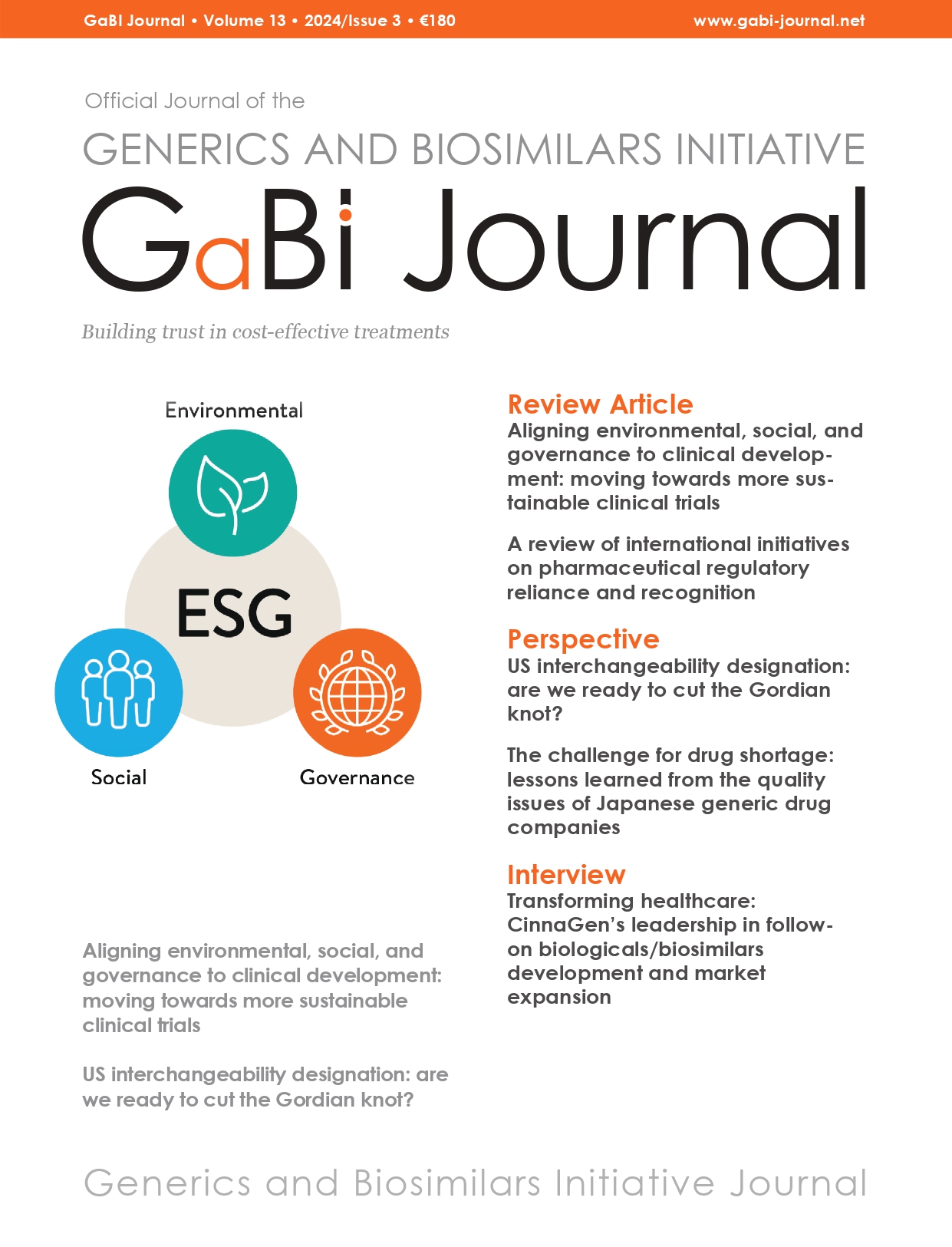Strategies used to delay or prevent access to affordable generic drugs in the US
Published on 2016/12/12
Generics and Biosimilars Initiative Journal (GaBI Journal). 2016;5(4):188.
Submitted: 28 November 2016; Revised: 29 November 2016; Accepted: 30 November 2016; Published online first: 5 December 2016
In the journal Blood, Jones et al. [1] discuss strategies used by brand pharmaceutical companies, often in combination, to delay market entry of affordable generic drugs in the US and other countries. They highlight how these strategies may be mutually beneficial to the parties concerned but are anticompetitive and act against public interest by driving up drug prices to the detriment of many patients who cannot afford to pay for treatments.
The first strategy used by brand pharmaceutical companies is a ‘pay-for-delay settlement’, whereby generic competitors who challenge the patent are offered a lucrative sum (often exceeding potential profits) for delaying market entry and withdrawing any patent litigation. This ensures a longer period of exclusivity to the patent holder. A reverse situation also occurs where the generic competitors pay the patent holder a sum to enter the market. Either way, Jones et al. argue that the losers are the patients as affordable drugs move further out of their reach.
According to the ‘Drug Price Competition and Patent Term Restoration Act’ (Hatch–Waxman Act), brand companies can produce authorized generic versions of a drug during the first-filing generic drug’s 180-day exclusivity period. Authorized generics are produced by brand pharmaceutical companies, often in conjunction with other companies, and are given a different name and priced lower at generics prices. Generics companies are sometimes granted intellectual property to allow market entry early. Pay-for-delay settlements can also include promises not to introduce authorized generics that would compete with the generic drug company’s version.
Although the production of authorized generics offers consumers a short-term reduction in price (4–8% in retail prices and 14–17% in wholesale prices), Jones et al. believe that authorized generics are a ‘coercive tool’, as they can affect first-files long-term revenues by up to 63% in the 30 months thereafter. They also believe that these settlement tactics can create a brand monopoly (the generics company agreeing to delay market entry and the brand company agreeing not to introduce authorized generics during the exclusivity period).
Product hopping is another tactic used by brand pharmaceutical companies, also known as ‘forced switching’ or ‘evergreening’. This occurs just before patent expiry and involves the brand company substituting the existing drug with a non-therapeutically different reformulated version, i.e. slow-release given once daily rather than two tablets daily. Heavy marketing aimed at doctors, patients, or both, then ensues to encourage the switch to the new drug, and the old drug may be withdrawn. The upshot of this is that once the generic drug version enters the market, pharmacist substitution for the new branded version is impossible because, in accordance with state law, dosage strength and other characteristics must be bioequivalent. This strategy has often been used in conjunction with pay-for-delay settlements to buy extra time to engineer the switch to the reformulated version. In the long term, the generics competitor will not be able to benefit from automatic substitution according to state laws.
According to a report for the US Senate Committee on Health, Education, Labor and Pensions on personal drug importation and public health, international online pharmacies are as safe as domestic ones for personal use; however, in the US, drugs valued at US$2,500 or less must be destroyed ‘in the interests of public safety’ in accordance with Section 708 of the Food and Drug Administration Safety and Innovation Act (FDASIA) to discourage patients obtaining the same drugs in cheaper markets, such as Canada.
Lobbying, branding and aggressive advertising are well established marketing strategies used by pharmaceutical companies. On a wider, more aggressive, scale brand pharmaceutical companies have been acquiring competitor companies and immediately hiking up drug prices. As Jones et al. point out, such marketing strategies have become a general trend ‘abandoning the dual mission of social corporate responsibility to both help patients and make profit in favour of a mission to maximize profits at any cost’.
A European Commission (EC) report found that, between 2000 and 2008, 22% of settlements in the European Union involved payments from the brand to the generic company, and a restriction on generics entry, although this figure had decreased to 8% by 2014. The EC has been clamping down on individual companies deemed to be violating the ‘proper functioning of normal competition’. Canada has taken an equally firm stance on reverse payment settlements. Jones et al. also allude to a report by the Canadian Competition Bureau, which states that it would consider applying civil and (for a more limited category of behaviour) criminal liability to reverse-payment settlements.
Jones et al. highlight 10 possible corrective measures based on US legislation that could be applied to remedy the situation in the US: these include allowing Medicare to negotiate drug prices, monitoring and penalizing pay-for-delay strategies that are anticompetitive, and allowing transportation of drugs across borders for personal use. The essence of these measures, they conclude, is simple: ‘reduce the cost of drugs and improve patient access and treatment security’.
Competing interests: None.
Provenance and peer review: Article abstracted based on published scientific or research papers recommended by members of the Editorial Board; internally peer reviewed.
Maysoon Delahunty, GaBI Journal Editor
References
1. Strategies that delay or prevent the timely availability of affordable generic drugs in the United States. Blood. 2016;127(11):1398-402.
Disclosure of Conflict of Interest Statement is available upon request.
Copyright © 2016 Pro Pharma Communications International
Permission granted to reproduce for personal and non-commercial use only. All other reproduction, copy or reprinting of all or part of any ‘Content’ found on this website is strictly prohibited without the prior consent of the publisher. Contact the publisher to obtain permission before redistributing.


